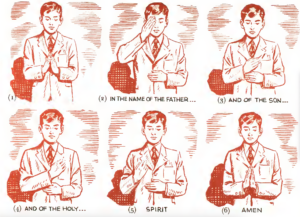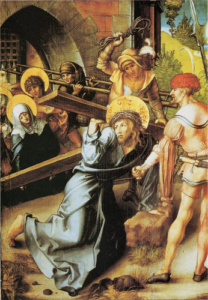
“Baptism, the gateway to the sacraments and necessary for salvation by actual reception or at least by desire, is validly conferred only by a washing of true water with the proper form of words. Through baptism men and women are freed from sin, are reborn as children of God, and, configured to Christ by an indelible character, are incorporated into the Church.” Canon 849
What makes a baptism “valid”? Seeing as the sacrament of baptism is so important to entering into the Catholic Church it only makes sense that the magisterium would be as strict on the rules of baptism as they are. There are several requirements for a baptism to be valid although according to Canon 850, the church may forgo some requirements in urgent circumstances.
The #1 rule is that when the baptism is performed it must be in the valid trinitarian formula ¹. The reason I denote “valid” is because in a few cases if you were baptized outside of the church even in the trinitarian formula the Catholic Church may not recognize its validity. This is only the case if the other churches’ belief of the Trinity is in extreme disagreement with the Catholic Church’s understanding such as Mormons.² Unless a grave matter arises, baptism must be performed by the parish priest or someone explicitly authorized to baptize by the priest ³. However, in the case of an emergency baptism may be performed by anyone Christian or non-Christian ⁴.
At the start of the process, preparations are to be made for the baptism. The faithful must be predisposed to receive the graces bestowed in the sacrament. An adult must first be admitted into the catechumenate and led through the various stages of sacramental initiation. As adults who have reached “the age of conscience,” they are to be educated in the faith as they must make a conscious decision to enter into communion with the church. However, if the adult cannot make a conscious informed decision due to disability is regarded as an infant for the sake of baptism⁵. For infants, the pastor must educate the families on the meaning of the sacrament and their responsibility to lead the child in the faith.
When it is time for the baptism unless otherwise necessary it should take place in a church or oratory. Unless just cause arises the baptism should take place in the faithful’s home parish ⁶ and unless in case of necessity, Holy water must be used⁷. Even in cases of necessity where Holy water cannot be used regular Water must be used for baptism. No other substance is acceptable.⁸
In brief, as long as baptism is performed and meets at minimum these two criteria it is considered valid
1)The baptism is performed using Water
2)The baptism is performed using the valid trinitarian formula
¹Council of Florence
²THE QUESTION OF THE VALIDITY OF BAPTISM CONFERRED IN THE CHURCH OF JESUS CHRIST OF LATTER-DAY SAINTS
³Canon 530
⁴Canon 861
⁵Canon 852
⁶Canon 857
⁷Canon 853
⁸CCC 1278

 First Sorrow: Mary Hears the prophecy of Simeon in the Temple
First Sorrow: Mary Hears the prophecy of Simeon in the Temple Second Sorrow: Mary flees with Joseph into Egypt to save Jesus
Second Sorrow: Mary flees with Joseph into Egypt to save Jesus Third Sorrow: Mary loses Jesus and finds Him again in the Temple
Third Sorrow: Mary loses Jesus and finds Him again in the Temple Fourth Sorrow: Mary meets Jesus carrying the cross on the way to Calvary
Fourth Sorrow: Mary meets Jesus carrying the cross on the way to Calvary Fifth Sorrow: Mary is present at the Crucifixion and Death of Jesus
Fifth Sorrow: Mary is present at the Crucifixion and Death of Jesus Sixth Sorrow: Mary receives the dead body of Jesus in her arms
Sixth Sorrow: Mary receives the dead body of Jesus in her arms Seventh Sorrow: Mary accompanies Jesus to His Burial
Seventh Sorrow: Mary accompanies Jesus to His Burial
Hey everyone! ZALV88 is my new favorite. Easy to use interface and a wide selection of games, what’s not to love? Give zalv88 a try, you might just find your new lucky spot!
Dewabetvn8 – Heard good things. Thinking of throwing a few bucks in and seeing how it goes. The graphics look pretty slick to be fair! Check it out for yourselves: dewabetvn8
Realsbetbrazil, ah Brazil! Passion for football and maybe passion for betting too! If you’re looking for good odds and love your local leagues, might be worth a peek! Find them at: realsbetbrazil
Alright, Malaysia! Heard Jili99MY is the place to be. Let’s see if it lives up to the hype! Wish me luck on those spins jili99my